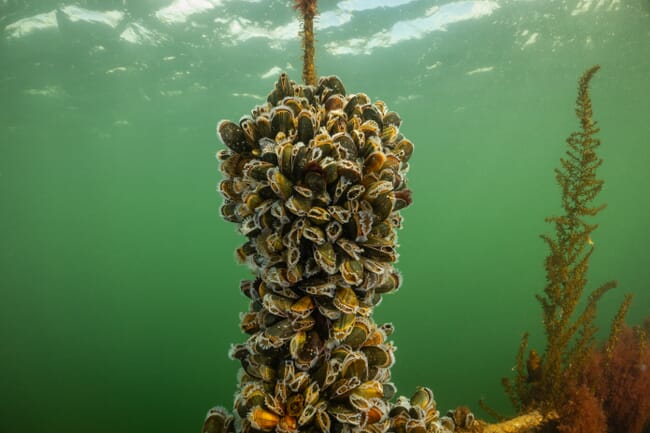
© Shutterstock
A research project by the University of Auckland and the University of New England assessed the diversity and abundance of wild fish and invertebrates on farms growing kelp and mussels compared to non-farmed sites in the Hauraki Gulf and the Gulf of Maine, United States. The research, which was supported by The Nature Conservancy in New Zealand and Maine, found mussel and seaweed farming has potential to provide habitat for marine species, as well as providing food for people.
Dr Andrew Jeffs, Professor of marine science at the University of Auckland explained that the fish populations found on mussel and kelp-mussel farms in the Hauraki Gulf were equal to or greater than those at the non-farm sites, in both diversity and abundance.
“In an examination of gut contents of snapper living inside and outside New Zealand green-lipped mussel farms, fish living on the farm sites were also found to be eating more nutritious diets than those living in natural habitat,” Jeffs added, in a press announcement of the research.
Dr Jeffs says these results are a promising sign that mussel and kelp farms can provide both settlement and nursery habitat and an important source of food for wild fish species.
The Maine research highlighted the importance of timing in the overlap between kelp farms and species presence in the nearshore. During the Maine kelp growing season, October to May, there was no significant difference in species abundance or diversity between farm and non-farm sites.
“This is good news in a region where seaweed farming is highly seasonal, with farmers removing the kelp and equipment after the spring harvest. What we see here in Maine is that farm ecosystems are not a replacement for wild ecosystems, but they do offer some restorative or regenerative properties that can help buffer against climate impacts, at an ecosystem level and human level,” explained Dr Carrie Byron, Associate Professor at the University of New England.
While this and other research shows that kelp and shellfish farms can provide important ecosystem benefits, the future of the industry depends on social acceptability and the perceived value consumers may place on ecosystem services provided by aquaculture.
To better understand the potential importance of aquaculture’s ecosystem services in the marketplace, researchers from University of New England, University of Massachusetts, and Stanford University asked U.S. consumers what price they would be willing to pay for a range of seaweed products. After being shown a short video about the ecosystem services associated with seaweed farming, consumers indicated that they were willing to pay more for the same products, suggesting hope for the future of the industry.
“It’s clear that consumers care about the environmental impact of seaweed products. This justifies continued exploration in this line of inquiry, which can ultimately help fully realise aquaculture’s full environmental potential,” said Dr Heidi Alleway, senior aquaculture scientist from The Nature Conservancy Worldwide Office.




